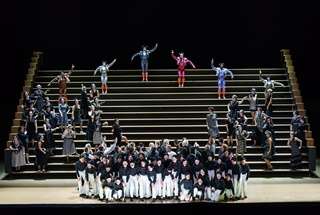|
Back
Stairway to Carmen London
Royal Opera House
11/30/2018 - & December 4, 8, 11, 14, 19, 22, 2018
Georges Bizet: Carmen
Dominic Sedgwick (Moralès), Eleonora Buratto (Micaëla), Brian Jagde (Don José), Jean Teitgen (Zuniga), Gaëlle Arquez (Carmen), Haegee Lee (Frasquita), Aigul Akhmetshina (Mercédès), Alexander Vinogradov (Escamillo), Germán E. Alcántara (Dancaïro), François Piolino (Remendado), Claude de Demo (narrator – “Voice of Carmen”)
Royal Opera Chorus, William Spaulding (director), Orchestra of the Royal Opera House, Keri-Lynn Wilson (conductor)
Barrie Kosky (production), Katrin Lea Tag (sets and costumes), Joachim Klein (lights), Otto Pichler (choreography)

(© ROH/Bill Cooper)
One of the repertoire’s most exasperatingly standard operas, Carmen has returned to the Royal Opera House in a production that premiered last year. Bizet’s best known opera often degenerates into a caricature or cliché of itself. The saturation of espagnolerie – all those dances and castanets and bullfighting – has long wearied audiences. In an age of identity politics, it can even rely on stereotype. The flamboyant director Barrie Kosky thought it wisest to shear the opera of much of its Spanish character. Except for the costumes – which include hot pink leggings for Escamillo, the bullfighter for whom Carmen throws over her insecure but ultimately murderous paramour Don José – all trace of national color, locale, and ambiance is removed. Unfortunately, this means we are left with an enormous staircase that dominates all four acts. It does move forward and backward a bit, and can creatively serve as a place to seduce, kill, sleep, or dance, but its omnipresence seemed a bit stale and left the production with an unappealingly antiseptic quality. Worse, without any accoutrement or suggestion of place, Kosky found it necessary to have the scenes described by an unseen but disastrously overamplified narrator, described in the program as the “Voice of Carmen,” who, apparently, is narrating the story of her life from beyond the grave. Belted out by someone called Claude de Demo (did she audition with a demo tape?), the lines also include a rather useless meditation on how to describe a beautiful woman, lines from the Prosper Mérimée novella of 1845 which even Bizet’s librettists Henri Meilhac and Ludovic Halévy saw fit to cut for operatic adaptation generations ago, and some of the opera’s spoken dialogue and recitative. At first, the effect was too loud to be anything other than intrusive, but I succeeded in tuning it out by the second act.
With no sets to speak of, the production relied heavily on dancers of rather strong competence, and, less fortunately, on mimes who would have been brought up on charges of minstrelsy or any related politically incorrect thought crime if they were enhancing any opera with nonwhite characters. It took away from the majestically triumphant Toreador’s Song, sung daringly and (perhaps unintentionally) with a beguiling Russian accent by the excellent baritone Alexander Vinogradov, to have the character’s actions and feelings conveyed through interpretive gesture, and little of it was necessary at any other time in evening. Another puzzling directorial choice was to restore music cut prior to the opera’s world premiere. Authenticity has some curatorial appeal, but as a result, Carmen’s famous “Habanera” ends in a nearly fugal ensemble with the chorus, an effect that diminishes the character’s frenzied individuality and depersonalizes her rampant sexuality. In the finale murder scene, Don José has some awkward music to pace around to before he calls out confessing his crime and welcoming arrest. A cheekier new twist on the opera’s end has the murdered Carmen rise, face the audience, and shrug. We might as well have shrugged back, since this meant nothing.
The young French mezzo-soprano Gaëlle Arquez got off to a slow start in the title role. But whatever held her back dissipated handily after about the first forty minutes. This young artist, who sang some performances in last season’s premiere run, had a strong handle on the part and delivered it with the panache of a larger than life Golden Age actress whose sultry voice matched her physical moves as well her psychological ones. Brian Jagde had a few hoarse moments but was an estimable Don José. The lithe Italian soprano Eleonora Buratto contributed a Micaëla so endearing that it was impossible to ignore her girl next door mien in the way we usually do when confronted by the lusty title character.
Keri-Lynn Wilson led a blustering performance that hit the brass too hard to keep up with Kosky’s de-Spanification efforts. The Royal Opera has an extraordinary gift in its choral director William Spaulding, who commanded a meticulous performance from his singers. I have never heard a more memorable end to the opera’s second act – all restraint came undone in a magnificent, mellifluous blending of sound.
Paul du Quenoy
|